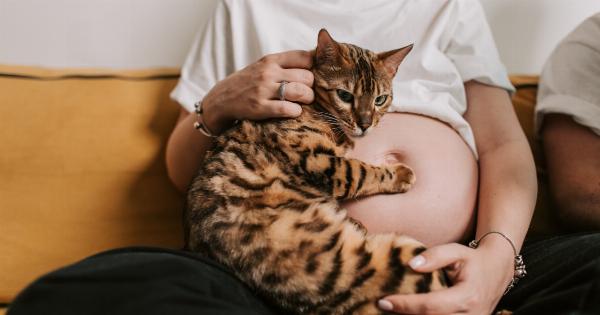When you find out that you are pregnant, many thoughts and concerns may race through your mind. One common question that arises is how your beloved pets will adjust to your pregnancy, and how your pregnancy will affect your pets.
In this article, we will explore the relationship between pregnancy and pets and discuss the potential impacts on both.
1. Emotional Support During Pregnancy
One of the significant benefits of having pets during pregnancy is the emotional support they can provide. Pets, such as dogs and cats, can sense changes in their owners’ moods and behaviors.
They can be a source of comfort and companionship during the rollercoaster of emotions that often come with pregnancy.
Research has shown that interacting with pets can increase levels of oxytocin, a hormone related to bonding and relaxation, in pregnant women. This can help reduce stress and anxiety, which are common during pregnancy.
Having a pet by your side can also alleviate feelings of loneliness, especially if you live alone or are on bed rest.
2. Physical Benefits of Pets during Pregnancy
Besides the emotional support, pets can also offer physical benefits to pregnant women. Dogs, for example, encourage exercise through daily walks and playtime.
Staying active during pregnancy is crucial for maintaining a healthy weight, minimizing pregnancy complications, and boosting overall well-being.
Furthermore, having a pet can motivate pregnant women to engage in regular physical activities, such as stretching and bending, which can help prepare their bodies for labor.
However, it is essential to consult with your healthcare provider about the level and type of exercise that is safe for you and your pregnancy.
3. Allergies and Pet-Related Health Concerns
While pets can bring joy and comfort during pregnancy, it’s important to consider potential allergies or health concerns that may arise.
If you or your partner have known allergies to pet dander, it’s advisable to discuss this with your healthcare provider before making any decisions regarding your pets.
In some cases, allergies can worsen during pregnancy due to hormonal changes and an increased sensitivity to allergens. If necessary, your healthcare provider may recommend certain precautions or adjustments to manage allergies while living with pets.
4. Introducing Your Pet to the Baby
As your due date approaches, it’s essential to introduce your pet to the idea of a new family member. Pets may become curious or stressed when they notice changes in your physical appearance or routine.
It’s advisable to gradually introduce them to baby-related items, such as cribs, strollers, and baby sounds.
Additionally, enrolling in pet obedience classes or working with a professional trainer can help ensure your pet is well-prepared and adaptable for the changes that come with a new baby.
This can include learning basic commands and boundaries to create a safe environment for both your pet and baby.
5. Precautions to Take during Pregnancy
While pets can offer numerous benefits during pregnancy, it’s important to take certain precautions to safeguard both your health and the well-being of your pets.
– Hygiene: Practice good hygiene by washing your hands thoroughly after handling pet waste or cleaning litter boxes and cages.
This helps minimize the risk of contracting any potential infections, such as toxoplasmosis, which can harm your pregnancy.
– Avoiding certain areas: It’s advisable to avoid changing litter boxes if possible, as they can contain parasites that may be harmful to pregnant women. If cleaning is necessary, wear gloves and wash your hands afterward.
– Dental care: Oral health is essential during pregnancy, and this includes taking care of your pets’ teeth.
Dental infections can potentially affect your pregnancy, so be mindful of your pets’ oral hygiene and schedule regular veterinarian check-ups.
– Flea and tick control: Proper flea and tick control for your pets help reduce the risk of disease transmission. Consult with your veterinarian to find safe and pregnancy-friendly options for flea and tick prevention.
6. Adjustments after the Baby Arrives
When the baby arrives, your pet may experience some adjustments as they share the spotlight and their routine changes.
It’s crucial to gradually introduce your pet to the new family dynamic and set boundaries to ensure everyone’s safety and well-being.
Make time for regular one-on-one interactions with your pet, even if it’s just a few minutes of undivided attention. This helps them feel included and prevents feelings of neglect or jealousy.
Additionally, consider maintaining your pet’s routine as much as possible to minimize stress.
7. The Benefits of Pet Interaction for Babies
Growing up with pets can have numerous advantages for children. Studies have shown that children who are exposed to pets early in life may have a lower risk of developing common allergies and asthma.
Interaction with animals can also teach empathy, responsibility, and promote social skills in children.
However, it’s crucial to supervise all interactions between pets and infants or young children. Never leave them unsupervised and teach your children how to treat animals with kindness and respect.
8. Planning for Pet Care during Labor
When the time comes to give birth, it’s vital to plan for your pet’s care while you’re in the hospital. Arrange for a trusted family member, friend, or pet-sitter to take care of your pet during your absence.
Ensure they are familiar with your pet’s routine, feeding schedule, and any necessary medications.
Consider preparing a pet emergency kit with essential supplies, such as food, water, medications, and contact information for your veterinarian.
This ensures that your pet is well-cared for in case of any unexpected situations while you’re in the hospital.
9. Seeking Professional Advice
Each pregnancy and each pet are unique. It’s always advisable to seek professional advice from your healthcare provider and veterinarian regarding your specific circumstances and concerns.
They can provide personalized guidance and address any specific medical or behavioral concerns you may have about your pet during pregnancy. Remember, they are there to support you and help ensure the well-being of both you and your furry friend.
10. Conclusion
Pregnancy and pets can coexist harmoniously with proper planning and precautions. Pets offer emotional support, encourage exercise, and can provide a positive environment for the whole family.
By taking the necessary steps to ensure everyone’s safety and well-being, you can enjoy the many benefits of having a pet while expecting a new addition to your family.































